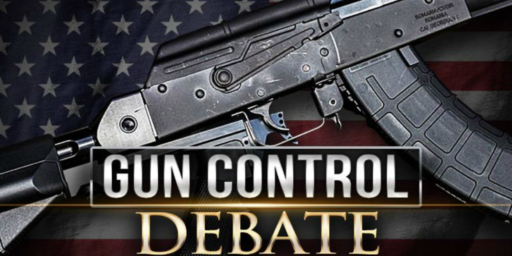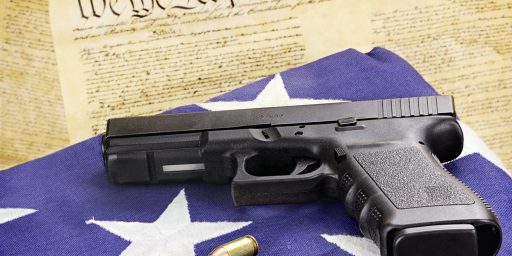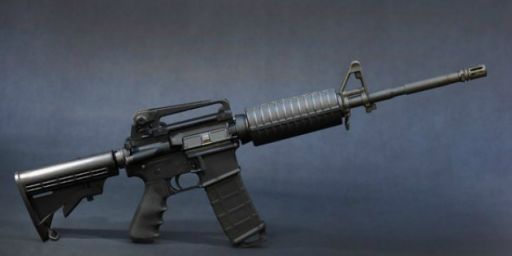Activist Judges Overturn Democratic Process Again
In a 5-4 decision, the Supreme Court has overturned the D.C. handgun ban, thwarting the democratic process.
The Supreme Court ruled Thursday that the District of Columbia cannot ban a citizen from keeping a handgun at home, throwing out one of the nation’s strictest gun control laws.
The Supreme Court has overturned Washington, D.C.’s strict gun ban.The 5-4 decision marks first time the court has ever definitively addressed the issue, which had been one of the great unresolved constitutional questions as experts debated whether the Second Amendment protects an individual’s right to keep and carry a gun, or only a state’s right to arm a militia.
The opinion isn’t up on the Supreme Court’s website as of the time of this writing, but I’m sure that conservatives will be quick to excoriate the flagrant judicial activism of the court in this case, while liberals will be defending the Court for upholding an individual right enshrined in the constitution.
Right?
Update: SCOTUSBlog has the opinion here. I haven’t time to do much but skim the summary, but it seems on first glance to be a good decision. The most interesting thing to me so far is that the Court declined to overturn U.S. v. Miller.
Update (James Joyner): I had planned to write something similar when the decision came down, since this was the expected result. Snark aside, while I think this is exactly the right interpretation of the 2nd Amendment — one can’t imagine that the Framers, so soon after gaining their independence in a war initially fought by people supplying their own weapons from their private cache meant merely to protect state-owned arms — it’s not a “conservative” decision in two senses. First, stare decisis would seem to have indicated the contrary ruling. Most recent precedent has been in favor of states and municipalities restricting firearms; the 2nd Amendment had previously been construed very narrowly. Second, as Alex suggests, it overturns the will of the people of DC as expressed through their elected representatives.
Update (Alex Knapp): I’ve now read the entire decision, and I think it provides a fair reading of the Second Amendment. The way I understand it, though, it doesn’t appear that most gun control laws are going to be at risk as a consequence of this ruling–just particularly onerous ones or outright bans of commonly used guns. And, as Dodd points out below, this opinion does not overturn Miller because Scalia does not find Miller to be incompatible with the Second Amendment, which is the view of a number of legal scholars as well.
It’s also worth pointing out that James is absolutely correct that this isn’t a “conservative” opinion, because the democratic process was, in fact, thwarted. Which goes to show the value of a republic over a democracy. We’re supposed to be living in the former.






If someone reads the opinion, I’d be interested to know whether it addressed whether the 2d amendment became applicable to the states under the “incorporation” theory through the 14th amendment. I thought Scalia had spent a career criticizing made-up law like that, so it would be interesting to know if he now penned the next (and one of the last) chapter of that incorporation story or if they somehow dodged it because DC is not a state.
Alex misses the point that the 2nd amendment predates the DC gun ban by a few years so the idea of the court making law is childish. Most of the country allows the ownership of handguns and throughout most of our history guns have been legal. Sticking with the tradition in culture and law is far from making it up.
So before making up what others think perhaps it is best to wait and think yourself.
The Court did not address incorporation since it was not a question prestented.
Steve,
Having just finished reading the decision, I agree with it. But it’s important to recognize that courts usually don’t “make law” at all. They didn’t in this case nor do they in many areas in which they are accused of same.
There was no need to overturn Miller; the Court merely corrects the misapplication of that decision:
It seems like Justice Stevens suggested that Scalia et al. were not true conservatives in his dissent:
this was most certainly not overthrowing a Democratic process. If there are some who think a ban is the way to go they do have the option of amending the constitution. But clearly, the law was unconstitutional.
Now, it may very well have thwarted Democratic Party process, but of course that’s another matter altogether.
Well, no actually. But if you want to believe that about someone like me, make the most of it.
Why is it that without even looking I bet I can guess who the five are and who the four are.
Not being a lawyer, I stand somewhat confused. What has the will of a limited numbeer of people in D.C. got to do with the constitutional right of all citizens to bear arms? If they have the power to overule the constituion (without amendment)can’t they also pass a law depriving a woman the right to kill her unborn child, or take away the freedom of the press, or not pay income taxes or ????? Help me out here, please.
Decisions such as this are funny, because as the author states, the “conservative” justices over rule the ruling of a state government, going against states rights principles. There also seems to be a serious disconnect between cities which have massive crime problems and more suburban and rural areas.
Joe, the Second Amendment restricts the federal government (including the District of Columbia), not states. So technically there are no state’s rights issues. So long as a State’s Constitution allows it, a state could pass a gun ban that the SCOTUS just ruled that DC could not.
First, States have no power over constitutional rights. I think the reason the first 10 amendments are called the bill of rights is because that is what they are. While no right is absolute, the framers did add, “shall not be infringed” to only one right. As to activist judges. Activist Judges find law where none what written, ie, abortion rights in the 14th amendment. To the even semi-intelligent scholar a read of the 2nd amendment “A well regulated militia being necessary to the security of a free state (regulated meant at that time the ability to load and fire at a rate equal to military standards)THE RIGHT OF THE PEOPLE (US) TO KEEP AND BEAR ARMS SHALL NOT BE INFRINGED” would lead one to believe Americans have the absolute right (with very specific small limitations) to keep firearms useful to defend the other rights of the people. If the 2nd amendment were about anything else, the right to vote or drive a car, the definition would be clear by the last four words. The justices have done only half the job.
Justice Stevens, who has proven time and again that he is utterly shameless about contorting plain language out of all semblance of rational shape to suit his personal preferences, demonstrates in his dissent precisely why interpreting a right that expressly refers to “the People” as actually meaning “the State” is so dangerous. He purports to support his argument that the Second Amendment confers a ‘collective’ right by arguing that the First Amendment rights to assembly and petition for redress of grievances are ‘collective’ in nature rather than strictly individual rights.
Thus does a slipperly slope that ends with us having no rights at all begin. If standing athwart history yelling “Stop!” to such as that isn’t “conservative,” well, so be it.
Also sprache Zeldorf:
Uh, wrong. Absent a ruling of incorporation under the 14th Amendment, rights enumerated (or not) in the Bill of Rights are protected from infringement by the federal government. As P.D. Shaw said above, the Heller opinion did not incorporate the 2d Amendment against the states.
Thanks PD Shaw for the info. If you are right, this decision is one of narrow implication, only for DC and for federal gun restrictions. Seems like the story line in that case should be more about DC’s lack of states’ rights, and not about other states’ gun laws. My hunch is the media will cover it in such a way that most people will think this decision prohibits other states from passing similar laws.
But I suppose the decision, if focuses more on the “right of the people” than the militia part, may lay the groundwork for a later court to incorporate gun ownership as a fundamental right under the 14th Amendment. It would certainly be nice to put Scalia’s originalist faith to the test on that one.
Dodd,
That’s pretty much exactly why I think labels for jurisprudence are pretty meaningless. I am also not particularly fond of Stevens, though I think he writes some decent opinions. I think that this opinion was Scalia at his best, reminscient of his early opinions, and a Scalia we really haven’t see in awhile (his dissent in Bourdemine was just embarrassing). Alas, Scalia and Stevens both frequently fall on the “result first, justify later” jurisprudential scale.
For those interested, the incorporation (non) discussion is in footnote 23:
Scotusblog sees this as hinting at incorporating the Second Amendment, but the second sentence reads to me like Scalia needed at least one more vote so he offers assurance that the prior decisions, reaffirmed, will not be cast off lightly. OTOH, Stevens complains in dissent that he does not know whether this decision will increase the labor of federal judges to the “breaking point.” He seems to be anticipating more judicial activity than just the district of columbia. Just skimming the tea leaves.
Sam, what are you smoking. No state has the right to violate the 4th Amendment or the first. Why is it they can regulate the 2nd?
Sigh. Will someone get Zeldorf a clue rake…
Here you go.
DC is not a state. Therefore, the issue of incorporation was not before the Court in this case. It will, of course, be a factor in the next round of litigation (possibly starting in Chicago), so the Court will have to address it then.
Is that simple enough?
The premise of this post, that the Supreme Court did something improper by overturning a democratic process, is ridiculous. Any time a court overturns any law it is overturning a democratic process since a law does not exist without a democratic process. By this logic a court could never overturn any law, which is obviously silly.
T’was tongue-in-cheek, Russell. You new here?